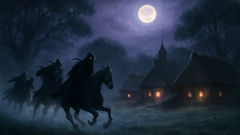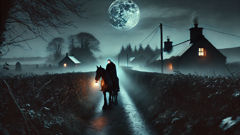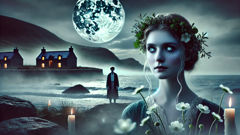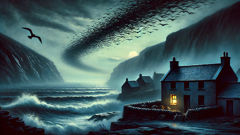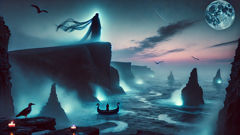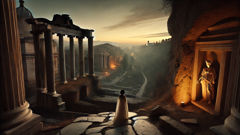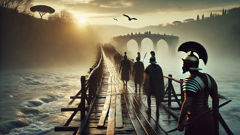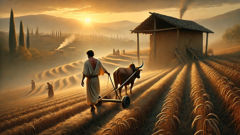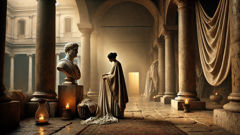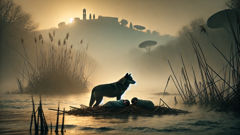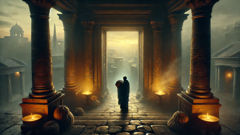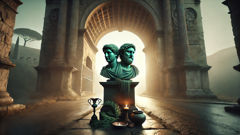Introduction
In the rolling heartlands of medieval Serbia, where the Drina and Morava rivers cut their way through forests thick with hornbeam and linden, the villagers of Dubrava lived in constant dialogue with the land and its secrets. Winters were biting, the snows deep and stubborn, but the arrival of Lent brought a different kind of chill—a dread rooted not in nature, but in legend. For it was said that during the first week of Lent, when the moon was fat and pale and the wind snapped at the shutters, the Todorac rode out from the ancient shadows. These were no ordinary riders, but spectral horsemen clad in tattered cloaks, faces obscured by bone-white masks, their stallions’ hooves wreathed in spectral mist. The Todorac were spoken of in hushed tones, their passage marked by the crushed grass of the meadows and the echo of iron-shod hooves. To cross their path was to court doom; the unlucky were found at dawn, trampled flat, eyes wide with terror, their souls said to be carried off to join the riders’ endless hunt. Yet the story of the Todorac is more than a tale of fear—it is the story of a village’s resilience, of a young girl named Mila who learned that even the oldest terrors can be faced, if one dares to look beyond the mask. Under the moon’s haunted gaze, Dubrava’s people gathered, whispering prayers and lighting fires, searching for hope as the legend thundered ever closer.
The First Night: Shadows Gather
As dusk deepened and the first day of Lent slipped into darkness, the village of Dubrava locked its doors and held its breath. Mila huddled beside her grandmother, Baba Ljubica, who recited the old prayers in a voice as steady as a river stone. Around them, the cottage flickered with the light of a dozen beeswax candles—each one a tiny bulwark against the night’s encroaching dread. Outside, the forest pressed close, branches creaking and scratching at the eaves like bony fingers.
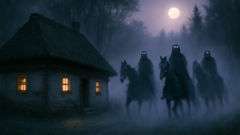
It was on this night that the legend felt most alive. Baba Ljubica’s eyes glinted in the firelight as she told Mila, for the first time, the full story of the Todorac. “Long ago, before even my grandmother was born,” she began, “the Todorac were men who bargained with things best left unspoken. They wished for strength and swiftness, to ride above all others. But when you bargain with shadows, shadows always claim their due.” Her words wove a tapestry of dread: horsemen who could not be seen by daylight, who roamed only when the fast began, their purpose lost to time but their fury undiminished.
Mila listened, heart pounding, as the wind rose and the forest seemed to answer with a low moan. She wanted to ask why the Todorac rode only during Lent, but something in her grandmother’s voice warned her not to. Instead, she pressed her face to the cool glass of the window, watching as a creeping mist stole over the fields. Far off, beyond the last fence post, she thought she saw movement—a flicker of pale light, a suggestion of riders in the swirling fog.
The night deepened. The village’s dogs fell silent, and an unnatural hush settled. Mila’s father, Stevan, circled the cottage, clutching a wooden cross and scattering handfuls of salt across the threshold. “We do not tempt fate tonight,” he muttered. “No one leaves, no one looks. Not until sunrise.”
But Mila could not sleep. Each hour seemed to stretch and thrum with silent menace. At midnight, a distant thunder rumbled, yet there were no clouds—only the moon’s watchful eye. Then, faint but unmistakable, came the sound: hooves striking stone, slow and deliberate. She held her breath. The Todorac were riding.
The next morning, news spread through the village like wildfire. Ivan the shepherd’s flock had scattered, his corral gate battered and splintered. Deep in the sodden grass, hoofprints circled in patterns too precise, too unnatural for any living horse. Ivan himself was found dazed and trembling by the riverbank, eyes glazed, muttering about riders with faces like death. Mila shivered as she listened, feeling the legend coil tighter around Dubrava’s heart.
The Legend’s Shadow: Secrets and Warnings
In the days that followed, Dubrava moved through Lent with a sense of siege. The villagers walked quickly and spoke little; children were kept indoors, and elders whispered superstitions at every hearth. Stories of the Todorac thickened like storm clouds. Some insisted the horsemen were the cursed souls of ancient warriors, punished for their pride. Others swore they were servants of a forgotten pagan god, riding in search of sacrifice. A few, braver or more foolish, claimed they’d glimpsed the riders up close: their horses had burning eyes, and their cloaks seemed to suck in the very light around them.
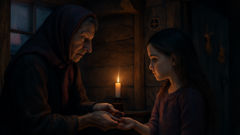
Mila pressed her grandmother for answers, but Baba Ljubica would only shake her head. "Some truths," she said, "are best left in the roots of old trees." But the girl could not rest; every night brought new terrors. Hoofbeats echoed on the wind, sometimes near, sometimes impossibly far. On the third night, a young woodcutter named Vuk failed to return home. His wife found his axe sunk deep into a willow stump, bloodied and abandoned. By dawn, the men of the village found Vuk’s tracks leading to a clearing at the forest’s edge—there, the ground was gouged with hoof marks in a spiraling pattern, as if some dark ritual had been performed.
Fear began to split the village. Some called for rituals, for extra prayers and more salt at every door. Others whispered of leaving Dubrava for safer lands, though none could say where safety might be found. The priest, Father Petar, took to ringing the church bell every hour after sunset, its sound a desperate plea to keep evil at bay.
Mila struggled with her own fear. But curiosity battled terror in her heart. She began to search for stories, gathering fragments from old women and muttering drunkards. A pattern emerged: every century or so, a child had vanished during Lent’s first week, always on a night thick with fog. And always, the Todorac rode more fiercely afterward, as if sated by their quarry.
One evening, as Mila helped her grandmother prepare supper, Baba Ljubica handed her a small object wrapped in linen—a charm of rowan wood and red thread. “Wear this,” she whispered. “It will not stop death, but it will help you see what others cannot.” Mila slipped it over her head, feeling the weight of centuries settle on her shoulders.
That night, she sat by her window again. The charm warmed against her skin as the mist thickened outside. And then—through the veil of fog—she saw them clearly for the first time: seven riders, cloaks billowing, masks gleaming bone-white. They moved with terrifying purpose, their horses never touching earth, their eyes locked on something only they could see. Mila’s heart pounded, but she could not look away. In that moment, she understood that the Todorac were not simply monsters; they were bound to something older, some ancient grief or unfinished task. And perhaps, just perhaps, they could be faced—not with swords or salt, but with understanding.
The Reckoning: Mila’s Stand
On the fifth night of Lent, the moon hung low and bruised behind the clouds. The village was silent but for the distant toll of Father Petar’s bell and the chuff of wind through bare branches. Dubrava felt stretched to its breaking point—every family huddled behind bolted doors, every heart thrummed with the fear of hooves.
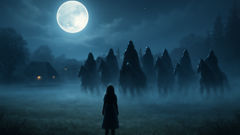
But Mila could not bear it anymore. She’d watched her neighbors wither with terror, seen children flinch at every creak and crack. Baba Ljubica had grown pale and silent, her eyes shadowed by dread. And so, as midnight approached and the mist crept in silver streams from the forest, Mila made her choice. She donned her grandmother’s charm, wrapped herself in her father’s old cloak, and slipped outside into the waiting dark.
The world beyond her threshold was colder than she’d imagined. The fields stretched out, ghostly and luminous in the moonlight, each blade of grass rimed with dew. The forest loomed black and bottomless. Mila’s breath hung before her in pale clouds, and every sound seemed magnified—a mouse’s scurry, an owl’s distant cry, her own heart’s thunderous beat.
She followed the hoofprints she’d seen earlier that day, deeper into the meadows beyond Ivan’s broken corral. The night pressed close, heavy with secrets. Suddenly, the air vibrated—the sound of hooves rose, impossibly loud. The Todorac emerged from the fog like spirits conjured from the earth itself: seven riders, mounted on horses whose eyes glowed like embers.
Mila stood her ground. The charm around her neck pulsed with heat. The riders circled, their masks reflecting the moon’s cold light. One drew closer—a figure larger than the rest, his cloak tattered and stained. He regarded her in silence, then spoke in a voice like distant thunder: “Why do you stand before us, mortal? Few dare witness our ride.”
Mila swallowed her fear. “I want to know why you ride. Why you hunt us. What binds you to this place?”
For a moment, nothing but wind and distant bell. Then, the leader’s mask shifted, and Mila saw—not a monster, but a face etched with pain, eyes burning with centuries of loss. “We are the cursed. We broke an ancient oath, defiled sacred ground for our own gain. Each Lent, we must ride as punishment, seeking what we lost but can never reclaim.”
Tears stung Mila’s eyes. “Is there no way to end your torment?”
He studied her, and for a heartbeat, the world seemed to hold its breath. “There is a way, but it requires a living soul to bear our story—to remember us with compassion, not just fear. If you have courage, child, speak our names and light a fire at dawn. Tell the truth of our fate.”
The riders withdrew into the mist, and the hoofbeats faded. Mila staggered home, heart racing, the charm now cool and silent against her skin. She knew what she must do.
Conclusion
When dawn broke over Dubrava, Mila gathered the villagers in the square. Her voice steady but soft, she recounted what she had learned: the names of the fallen riders, their broken oath, and their endless penance. She urged the villagers to remember—not with terror, but with sorrow and forgiveness. They built a great fire and scattered bread and salt around its edge. As the flames leapt skyward, Mila saw shadows lift from the fields and drift away on the morning breeze. For the first time in living memory, the Todorac did not ride that night. The terror that had ruled Dubrava for generations was eased—not destroyed, but changed by the courage of one who dared to look past legend and see the human heart within the myth. And so the story of the Todorac became a tale not just of fear, but of understanding: a reminder that every darkness hides a sorrow, and every curse waits for someone brave enough to break it.

